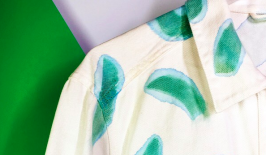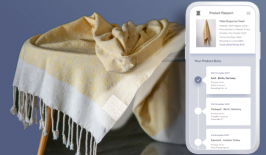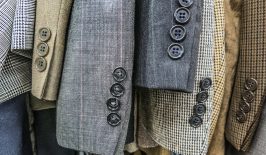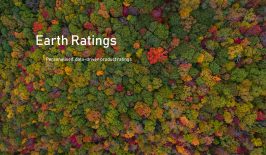As consumers’ awareness and understanding of environmental and social issues continues to develop, so too does their scrutiny of brands and companies. This is especially true for fashion, with climate conscious consumers now favouring clothes made by companies that can prove their products were made under socially ethical conditions and from ecologically-sound materials. The result is a boom in fashion innovations that aim to be kinder to the planet than traditional practices – from blockchain-based product passports that let you trace the journey of your clothes, mushroom leather and tech that reduces the environmental impact of cotton or the water footprint of a pair of jeans.
However, navigating this sector comes with challenges. As sustainability becomes a commercial buzzword, companies are shifting their marketing and public outreach to promote these new ideals. But which of them have actually made significant change? And which are still failing across the board?
Fairify.io is an online platform which aims to elucidate the fashion sector for conscientious consumers. The team has surveyed over 250 fashion brands, including big names and smaller companies, and produced a rating system which easily and conveniently shows the sustainability credentials of each. To do this, the Fairify team have developed a framework taking advantage of publicly available information, external researchers and even internal documents. Lars Dinjens, of Fairify’s Research and Operations explained to RESET:
“It’s our job to identify which steps fashion brands can or should take and award points for these steps progressively. We verify their input by talking with brands, with external sources when available and sometimes by requesting documents. We truly get to know the people behind the brand and where they stand in terms of sustainability.”
Some brands actively use Fairify’s platform and perform their own scan of their operations, while others are specifically chosen by the team. Either way, both approaches take advantage of the same methods:
“All brands are rated according to the same framework. Brands either take the Sustainability Scan themselves from the beginning or are invited to supply additional information once they are rated by a Fairify researcher. Within the framework/scan points are only awarded for actionable/measurable steps which we have quantified together with scientists and industry partners for every step along the way.”
Fairify investigates companies based on their Five Pillars of Fairness:
- Ambition: target goals, improving materials, charitable donations etc
- Transparency: auditing and emission reports, supply chain transparency etc
- Planet: materials, emissions, resources, recycling, packaging etc
- People: working conditions, wages, unions, fair trade etc
- Animals: animal testing, conditions and organic origins.
Once this information has been collated by Fairify staff and objective investigators, each brand is assigned a score based on an A-E scale. For example, a Fairify user looking for a new jacket can quickly spot a company such as Jack Wolfskin sports a rating of B, while others such as Canada Goose languish in the E territory.
Perhaps unsurprisingly, it is generally smaller, more locally sourced fashion studios and brands which consistently rate the highest on the scale. This is perhaps no accident, as many of these so-called ‘slow fashion’ brands have included sustainability from their outset and adopted it in a systematic way. According to Lars, this is a good approach for improving overall sustainability:
“Key to improvement is making sustainability a core activity for their business and shaping a clear vision of what sustainability or circularity can mean for their brand. Too many companies still treat sustainability as something that they must do and do not work on the subject systematically.
Not every brand has the same goals and can focus on everything at once but having a serious conversation with the team about where you want your brand to be a few years from now can really kickstart a process for improvement.”
Sustainability is Fashionable
According to a recent survey by management consultancy McKinley and Company, fashion consumers are becoming increasingly aware of the environmental and social impact of their purchases. 88 percent of respondents in Germany and the UK believe more should be done to improve the environmental credentials of the sector, while 57 percent claim they have made changes in their lives to improve sustainability. In particular, younger consumers have increasingly turned towards smaller online fashion brands, especially due to the coronavirus lockdowns.
Of course, statistics like these may encourage even larger, multinational companies – many of whom may have a tenuous relationship with sustainability – to promote the environmental and social virtues of their brands. This has led to so-called greenwashing, in which companies publicly espouse new environmental targets or practices, but without fundamentally shifting their methods. Fairify has also developed its rating system to try to outmanoeuvre such attempts at greenwashing. For example, significant shifts in trade practices and sourcing are weighed much higher than simply offsetting carbon produced by companies:
“A lot of brand sustainability marketing for example is focused on offsetting part of the emissions they generate. While this is definitely part of achieving carbon neutrality/positivity, it is only a marginal component within all sustainability efforts brands can do. For that reason, only a small number of points are awarded for this subject, which eliminates greenwashing on the topic. Same goes for every other component.”
Consumers can simply search Fairify.io for specific brands or products, or install a Google Chrome extension which provides the platform’s ratings as they browse the web. The extension can also automatically offer more sustainable alternatives when available.
Currently, Fairify is sticking close to the fashion industry, as there is still much work to be done in this sector. However, if sufficient progress is made, it is also possible Fairify will expand into other commercial sectors in the future.






